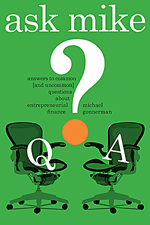  |
Running a company can be a lonely job. Sure, you have a management team, investors, perhaps a few friends you talk to. But when a really tough question comes up, who has to make the final judgment call? You do. Never mind that you're not an expert in every aspect of business management. The buck stops on your desk. You have to come up with an answer--an answer that very often affects your company's long-term success. Wouldn't you love to have a trusted advisor who can help answer these questions? Well, I'd like to offer you something pretty close--a new book I've written called Ask Mike. Ask Mike is a collection of 275 questions about tough issues of management and finance. The questions all come from actual problems I've encountered in 30 years as an advisor to high-tech startups and small companies. The answers--which one reader describes as "no-nonsense, cut-to-the-chase, and actionable"--reflect years of experience, technical savvy, and a heavy dose of common sense.
Let me tell you a little more about what you'll find in Ask Mike. I'm a CPA and financial advisor by training, so many of the questions I encounter deal with the occasionally-confusing world of financial reports, investor relationships, and cash management. For instance, Ask Mike will give you useful answers to questions like these: “We have huge quarter-to-quarter revenue swings that drive me crazy. My sales reps insist all the deals in their pipeline are genuine, but our sales cycle is long—an average of six months—and they say there’s no way to predict exactly when a customer will decide to sign on the dotted line. Is the situation hopeless?” “I joined a small startup team as chief technology officer (mostly unpaid) in return for 15% of the company. Now, after six months, the company has brought in investors and new employees, who are all getting lots of new shares. I’m now left with less than 5% of the company. Shouldn’t the founders give me the percentage I was promised?” “The collections department of our former printer has been calling just about everyone in my company about our past-due account. We really don’t have the cash to pay him right now, but his relentless nagging has been terrible for morale and I’d do almost anything to make him lay off. Your advice?” “Over the past few years, I’ve been a board member of three companies and invested in a dozen more, all of which claim that their accounting is ‘conservative.’ Is there a simple test—a balance sheet ratio, say, or a revenue recognition method—that indicates conservative vs. aggressive accounting? Or is this just hot air?” I've also been involved as an advisor with a good many companies that have negotiated successful merger and acquisition deals, and I have answers to a lot of questions that somehow never show up in the textbooks: “I gave a potential buyer for my company the resumes for all of my employees—20 people altogether. I just found out he’s had several conversations with my vice president of sales. The buyer says this is a standard due diligence practice, but I’m worried that he’ll decide it’s cheaper to steal my best people. How do I protect myself?” “I’ve been asked to leave part of the purchase price of my company in escrow, to guarantee that my receivables are collectible. That seems reasonable in theory, but how do I know if the buyer will aggressively pursue slow accounts if he can just tap the escrow any time there are difficulties?” “Our investors just pulled the plug on our financing, leaving us with a more-or-less finished product we can’t afford to launch. We don’t have any debt on the books, but we also don’t have any revenues. I think I know people who’d pay a fair price to acquire the work we’ve done, and I’m willing to invest a few more months trying to put together a deal. However, I don’t want to waste my time if buyers are just going to offer me a dollar ‘to take the business off my hands.’ Your advice?” You'll also find advice in Ask Mike about common problems of managing employees: “This isn’t a big deal, but I have a couple of engineers who always get parking tickets when they visit a downtown client. They put the tickets on their expense accounts, and they’ve suggested that I bill the client for these ‘expenses.’ Would this be proper?” “An upcoming layoff will require me to cut 25% of my accounting department’s headcount. I’m trying to figure out who to keep—people who fill the most ‘indispensable’ jobs or my most talented staff members. These are surprisingly different lists. Your advice?” “What should I do when sales people in my company submit expense reports that are six to nine months late? This is a delicate question, because our CEO does the same thing—in fact, I just wrote him a check for more than $20,000, right after I closed the books on our fiscal year.” Plus tips for dealing with partners and investors... “I have a partner who no longer plays any active role in the business and doesn’t collect a paycheck. However, he does use a company credit card very freely for personal expenses. He says he doesn’t want the rest of us to buy him out—this is just a ‘dividend’ for his equity. Is there any way we can resolve this situation without a legal battle?” “Our executive team has set up a very generous benefits plan for itself—luxury car leases, open-ended expense accounts, fancy office furniture, etc. I’m trying to put together a business plan to attract some expansion capital, and I’m worried what investors will think about our high standard of living. ‘It’s a sign of success,’ my boss says, but I’m skeptical. Your opinion?” “I’m one of three partners who set up a company that’s become very profitable. We each put in equal working capital, and we’ve each taken the same small salary for the past three years. But now my two partners, who mostly handle sales, are lobbying for big raises based on ‘market comparables.’ That leaves me holding the short end of the stick, because I’m the inside guy who handles operations and finance stuff—which usually isn’t as highly paid as sales. What do you think is fair here?” And difficult customers... “I quoted a new client a $10,000 fee for redesigning their Web site, and I thought I made it clear that the price was an ‘estimate.’ The actual job came in at $14,100, based on my hourly rate. Now the client says he thought I was quoting a fixed price, and he refuses to budge on paying for the extra hours. Can he do this?” “We have a standard contract when we sell software, but our customers routinely tinker with the terms. It’s never anything substantial, but the endless legal reviews cost us a lot of money, and it’s a huge hassle trying to keep track of special pricing, oddball deadlines, and other non-standard terms. Does everyone have this problem?” ”We have a chance to license one of our software tools to a company that will embed it in their own product. My lawyer has been great about identifying all the little points we have to negotiate about royalties, customization, support, etc. But he admits he’s not sure which issues deserve the most attention and which ones are probably unimportant. Are there two or three critical success factors you feel we should focus on?” In all, Ask Mike covers 136 topics like these--seventeen chapters on the whole entrepreneurial lifecycle, from raising money to building a business to making a graceful exit.
But don't just take my word for it. Listen to what entrepreneurs themselves say about Ask Mike: “Mike Gonnerman is an understated hero to the world of entrepreneurs," says Shari Agatstein, co-founder and CEO, Skelmir LLC "He's a true expert tied into the different communities that make up the business experience from board members to executives, financiers to accountants, employees to investors.”
"Every question in the book is one that people running high-growth companies are likely to face," remarks Drew Hannah, founder & partner, Drew Partners. "Mike's answers are reasonable, refreshing and clear...with no BS or management double-speak.”
Curious about why so many entrepreneurs love this book? It's easy to find out for yourself--just click here to reach a secure order form for a print copy or an immediate electronic download. And the next time a really tough question crosses your desk, reach for
your copy of Ask Mike. Odds are, you'll discover
an answer that helps you make a much smarter, better-informed decision. Sincerely, 
PS: I’m so confident that you’ll enjoy (and even treasure) your copy of Ask Mike that I offer this hassle-free guarantee: If for any reason you’re not satisfied with the book, just mail your copy back to me and I’ll promptly send you a refund for the purchase price. No questions asked. Click here to order. |
“I've relied on Mike's sage business and financial advice through the launch and development of several high-tech businesses. Now with this book, it's like having my own, private financial guru available at the flip of a page. It's chock-full of no-nonsense, cut-to-the-chase, actionable answers to challenging financial questions I routinely encounter in running my company.” —William Kazman, founder & CEO, Global Telemedix and iTeam “Mike Gonnerman is an understated hero to the world of entrepreneurs. This book sums up much that is Mike—a true expert tied into the different communities that make up the business experience from board members to executives, financiers to accountants, employees to investors.” —Shari Agatstein, co-founder and CEO, Skelmir LLC “Mike has a tremendous command of what it takes to create and run a successful business. He has captured this wealth of knowledge in a book that is a must-read for executives in new companies as well as established companies.” —Tom Marmen, former CEO, RaidCore “As an experienced operating CEO, board member and advisor to venture-backed companies, I found that every question in the book is one that people running high-growth companies are likely to face. Mike's answers are reasonable, refreshing and clear...with no BS or management double-speak.” —Drew Hannah, founder & partner, Drew Partners; formerly CEO of Parker Guitars and SoftBridge “I've been reading the Ask Mike columns for years, spanning one of my startups and a follow-on career as a consultant. His advice in these columns has been invaluable to me. Mike has an uncanny ability to ask the right questions and then offer insightful answers. I plan to keep this book close at hand, right next to my cash flow forecast.” —Paul Baudisch, co-founder, NetMarquee Online Services “ When Mike Gonnerman joined Powderhouse as consulting CFO, he helped us get financial clarity for the first time. Now a broader business audience will also get the benefit of Mike's wise counsel and expertise. And it's all couched in that distinctive Mike-style that makes astute business judgment sound like plain ol' common sense.” —Tug Yourgrau, co-founder and vice president, Powderhouse Productions |



